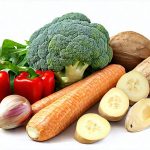Our digestive system is often taken for granted until something goes wrong. Bloating, constipation, or discomfort can significantly impact our daily lives. While many factors contribute to healthy digestion – hydration, fiber intake, exercise, and stress management – the foods we consume play a crucial role. Fruits, in particular, are fantastic allies for promoting gut health due to their natural sugars, fiber content, enzymes, and hydrating properties. Choosing the right fruits can ease digestive processes and improve overall well-being. This article will explore some of the best fruits to support optimal digestion, explaining why they work and how to incorporate them into your diet.
A healthy gut is fundamental not only for absorbing nutrients but also for a strong immune system. Many people struggle with digestive issues, ranging from mild discomfort to chronic conditions. Often, simple dietary adjustments can make a world of difference. Fruits offer a delicious and natural way to address these concerns without resorting to harsh remedies or drastic changes. Let’s dive into the specific fruits that stand out as champions for digestive health!
The Powerhouse Fruits for Digestive Health
Fruits are naturally designed to aid digestion. Their fiber content adds bulk to stool, promoting regularity and preventing constipation. Certain fruits also contain enzymes like bromelain (found in pineapple) which help break down proteins, easing the burden on your digestive system. Beyond these components, many fruits offer prebiotic fibers that nourish beneficial gut bacteria, fostering a thriving microbiome. A balanced microbiome is essential for efficient digestion and overall health. Including a variety of fruits ensures you’re getting a diverse range of nutrients and supporting different aspects of digestive function.
Many people overlook the hydrating aspect of fruit. Proper hydration is vital for moving food through your digestive tract efficiently. Fruits with high water content, like watermelon and berries, contribute to this process, softening stool and making it easier to pass. It’s not just about avoiding constipation; it’s about ensuring a smooth and comfortable digestive experience.
Specific Fruits & Their Digestive Benefits
Papaya is often hailed as the “fruit of digestion” for good reason. It contains papain, a powerful enzyme that breaks down proteins, making them easier to digest. This can be especially helpful for individuals who struggle with protein digestion or experience bloating after consuming meat. Beyond papain, papaya also boasts significant fiber content and plenty of vitamin C, further supporting gut health and immune function. Similarly, mangoes provide dietary fiber, vitamins A and C, and enzymes that aid in the breakdown of proteins and carbohydrates. They are a sweet treat that benefits your digestive system.
Bananas are well-known for their potassium content, but they also offer impressive digestive support. Green (less ripe) bananas contain resistant starch, which acts as a prebiotic fiber, nourishing beneficial gut bacteria. As bananas ripen, the resistant starch converts to sugar, changing their effect on digestion – so choose based on your needs! Apples, especially with the skin on, are another excellent source of soluble fiber called pectin, known to regulate bowel movements and soothe digestive upset. The gentle fiber content makes them a good choice for those prone to diarrhea or irritable bowel syndrome (IBS).
Berries: Small Packages, Big Benefits
Berries – blueberries, raspberries, strawberries, and blackberries – are nutritional powerhouses packed with antioxidants, vitamins, and fiber. Their relatively low glycemic index means they won’t cause rapid spikes in blood sugar, which can disrupt digestive processes. More importantly for digestion, berries contain both soluble and insoluble fiber. Soluble fiber dissolves in water, forming a gel-like substance that slows down digestion and helps regulate bowel movements. Insoluble fiber adds bulk to stool, promoting regularity.
The antioxidants found in berries also play a role in reducing inflammation within the gut. Chronic inflammation can disrupt digestive function and contribute to conditions like IBS. By incorporating berries into your diet, you’re not only supporting healthy digestion but also protecting your overall gut health over the long term. Adding them to smoothies, yogurt, or simply enjoying them as a snack are easy ways to reap their benefits.
The Role of Fiber & Prebiotics
Fiber is arguably the most important component for digestive health, and fruits offer diverse types of fiber. Insoluble fiber adds bulk, while soluble fiber softens stool and feeds beneficial bacteria. However, it’s not just about quantity; variety matters. Different fibers have different effects on digestion, so including a range of fruits ensures you’re getting a well-rounded approach to gut health.
Prebiotics are types of fiber that specifically nourish the good bacteria in your gut. A healthy microbiome is crucial for breaking down food, absorbing nutrients, and even regulating mood. Fruits like bananas (when green), apples, and berries all contain prebiotic fibers. Supporting your microbiome through dietary choices can significantly improve digestive function and overall well-being.
Hydration & Digestive Comfort
Don’t underestimate the power of hydration when it comes to digestion! Water is essential for moving food through the digestive tract efficiently. Fruits with high water content, such as watermelon, cantaloupe, and peaches, contribute to your daily fluid intake while also providing valuable nutrients and fiber. Dehydration can lead to constipation, bloating, and discomfort, so staying adequately hydrated is key.
When choosing fruits, opt for fresh, whole varieties whenever possible. Processed fruit juices often lack the beneficial fiber found in whole fruits and may contain added sugars that can disrupt digestion. Prioritizing whole fruits ensures you’re getting the full spectrum of nutrients and digestive benefits they offer.
Ultimately, incorporating a variety of these fruits into your diet is a delicious and effective way to support healthy digestion. Remember to listen to your body and adjust your intake based on your individual needs and sensitivities. Small changes can make a big difference in how you feel and function each day.


















